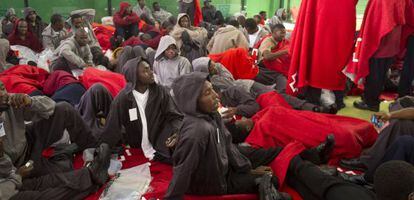Dozens of illegal migrants placed in hands of NGOs as state centers reach limit
Cádiz police precincts full following huge influx of boats carrying sub-Saharan immigrants this week

A total of 479 illegal sub-Saharan immigrants who arrived in Spain earlier this week in one of the biggest influxes of migrant boats on record remain packed into the indoor padel tennis courts in the municipal sports center in Tarifa, Cádiz province. Nobody – not the police, the Civil Guard and much less the Red Cross – know how much longer they might remain there. They are without shampoo, shower gel or towels. Three portable cabins containing toilets and showers were due to arrive on Thursday. Another 200 or so migrants are packed into the town’s other sports center and face similar problems.
Local police stations do not have the resources to identify the 1,219 undocumented migrants who arrived in the area from across the Strait of Gibraltar in small inflatable boats on Monday and Tuesday. Several hundred of them have already been moved to other CIE immigrant internment centers across the country, several of which are at bursting point.
The authorities have been trying to apply a number of quick solutions to solve the problem. Whole groups of immigrants have been going directly from police headquarters – where they leave carrying expulsion orders – into the care of NGOs. This means that dozens of immigrants will be at liberty, though without papers.
Spanish Prime Minister Mariano Rajoy has asked the EU to come up with a “strong policy against illegal immigration”
“The transfer to shelters is the consequence of a judicial decision,” explained an Interior Ministry spokesperson. There is no police surveillance in the NGO-run accommodation, which means the migrants there will be at liberty.
“There is nothing that can be done about it,” says one of the officers attending to the migrants. “We don’t have the capacity to manage everything. We try to document them, we copy down the names they give us, whether they are true or false, and we take their fingerprints. From there they go to the CIEs or to the NGOs. And once on the street, we are meant to have to identify them so they can be expelled. When we watch those images of the boats, our hearts just sink.” In private, other officers warn about the chaos that now reigns.
From Vilanova de Arousa in Pontevedra, where he is on vacation, Spanish Prime Minister Mariano Rajoy said on Thursday that Italy, under its current six-month presidency of the European Union, would be spearheading a “strong policy against illegal immigration,” though also one that aimed to help those who wanted to leave their countries.
Tarifa Mayor Juan Andrés Gil, of Rajoy’s Popular Party, called on Europe to come up with “cooperation policies so that Africa can develop itself and these people don’t have to jump into the water in boats.”
Gil played down the role of the patrol “dysfunctions” admitted to by Morocco, which have been blamed for the recent influx, saying that it was a global problem. “Morocco cannot do much more,” he continued. “I put myself in the shoes of my friend the mayor of Tangier, who has 10,000 immigrants there without papers. The European Union has to adopt real measures. We deserve this to change and for Africa to also have an opportunity.”










































